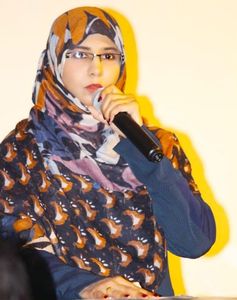One of the most prominent Deccan poets of the 20th century, Syed Ahmed Hussain, was famous for mining poetry out of his grief. In 1908, Hussain aka Amjad Hyderabadi clung to a tree for dear life and watched his mother, wife and daughter being washed away in one of the worst ever floods in Hyderabad. He wrote:
“Itni darya mein bhi na duba Amjad
Dubne walon ko bus ek chullu kaafi hain”
(Amjad could not even drown in a river,
Others drowned in a cup of water)
Today, more than a century later, Amjad’s writings are inspiring a band of young lovers of Urdu poetry, like software professional Mohammad Umar, 26. On a weekend three years ago, he was scanning the engagements section of a newspaper for something unique to do in Hyderabad. A few hours later, for the first time in his life, Umar recited an Urdu poem at an open mic event. “I did not even know what an open mic was,” he says. “I felt so nervous about participating.”
Umar says now that Urdu poetry has transformed him. “I am not the same person I was three years ago,” he says. He comfortably slips into a sherwani, hobnobs with renowned names at mushairas (poetic symposiums) in not just Hyderabad, but also Delhi and Lucknow, and presents shayari (Urdu poetry) in his distinct style.
The Deccan has always been a hub of cultural and literary activities, and a throbbing centre of Urdu poetry. The founder of Hyderabad, Muhammad Quli Qutb Shah, was a passionate poet. During the Nizam’s reign, the most popular poetess was the influential and charming courtesan Mahlaqa bai Chanda, whose tomb is still a popular heritage spot in Hyderabad.
Currently, Urdu Hall, inaugurated by prime minister Jawaharlal Nehru and located in the centre of the city, still hosts mushairas. But now, the younger generation has moved the ancient poetic tradition to cafes and performance spaces.
“The present organisations are old and outdated. There is no connection between the old and young generations. We wanted to build a bridge between them,” says Riyasath Ali Asrar, an engineering student who founded Anjuman-e-Fannan, a platform to promote poetry and reintroduce it to youngsters. Started in 2018, the organisation conducts open mic events, mushairas, talks and workshops for budding poets. According to the team, more than 200 people have attended their workshops. Whether it is ghazal, nazm or rubai, there are takers for all types of Urdu poetry.
A young poetess from Hyderabad, Tajammul Taaj Fatima, broke away from the conventional practice of using taqqalus or pen names as a suffix or prefix to one’s name. Instead, she chose ‘Taaj’ as her middle name. The journalism graduate is part of Mehfil-e-Khawateen, a literary organisation for women. The members meet every second Saturday to discuss and present their work. From writing about nature, and specifically about flowers, Taaj has come a long way. She has participated in dozens of mushairas, including the world’s longest online mushaira. Taaj says she loves the dakhni shayari, or the unique style of reciting poetry in the Deccani style, because “there is simplicity in it. It comes from the heart.”
Taaj recollects the subtle discrimination she faced from a few poetesses who felt that English graduates like her were a misfit in the world of Urdu poetry. She responded by composing a ghazal on language barriers and people’s perception of Urdu and English. She says that poetry helped her cope with the loss of her father.
The trend is not restricted to Hyderabad; talent can be found across Telangana. Touseef Khan, 25, hails from Nizamabad, 175km from Hyderabad. He does not have a background in poetry; his father is a businessman. Khan took a liking to poetry when he was 15. In the next two years, he studied works of stalwarts like Muhammad Iqbal, writer of ‘Saare Jahan Se Achcha’. At 17, he presented his poem at a local event organised by the state government. Despite having no formal training, Khan has written over 100 ghazals and participated in 25 mushairas.
He likes to write on politics and social justice. “For me, life cannot be about being born, having children and dying,” he says. “My poems should have an impact and I should be remembered even after my death. Whenever I sit down to write a poem, I feel I am planting a sapling whose fruits will benefit society later.”
When it comes to writing about the social issues of the region, none can parallel Maqdoom Mohiuddin. He was a communist leader, revolutionary and litterateur who led a rebellion against the Nizam. In the 1940s, he wrote an anti-war poem, Sipahi, which was later adapted into a Hindi serial starring Irrfan Khan.
Then there were poets like Gadbad Hyderabadi, Pagal Adilabadi, Chacha Palmuri and Sarpat Hyderabadi who specialised in humour. “Deccan poetry has an element of sarcasm in it,” says Riyasath. “Some poets from here highlighted serious issues like dowry through humour and sarcasm.” There were women, too, who aced this genre, like Dr Zeenat Sanjida.
“A judicious mix of humour and harsh reality is what makes life easy and comfortable. Who knows this better than Hyderabadi poets? They know how to cock-a-snook at life and smile at any situation that pains them,” writes Hyderabad-based senior journalist, J.S. Ifthekhar, in his book Urdu Poets and Writers: Gems of Deccan. He goes on to add, “Mizaheya Shayeri of Hyderabad remains very popular and potent enough to move even the stone-hearted.”



